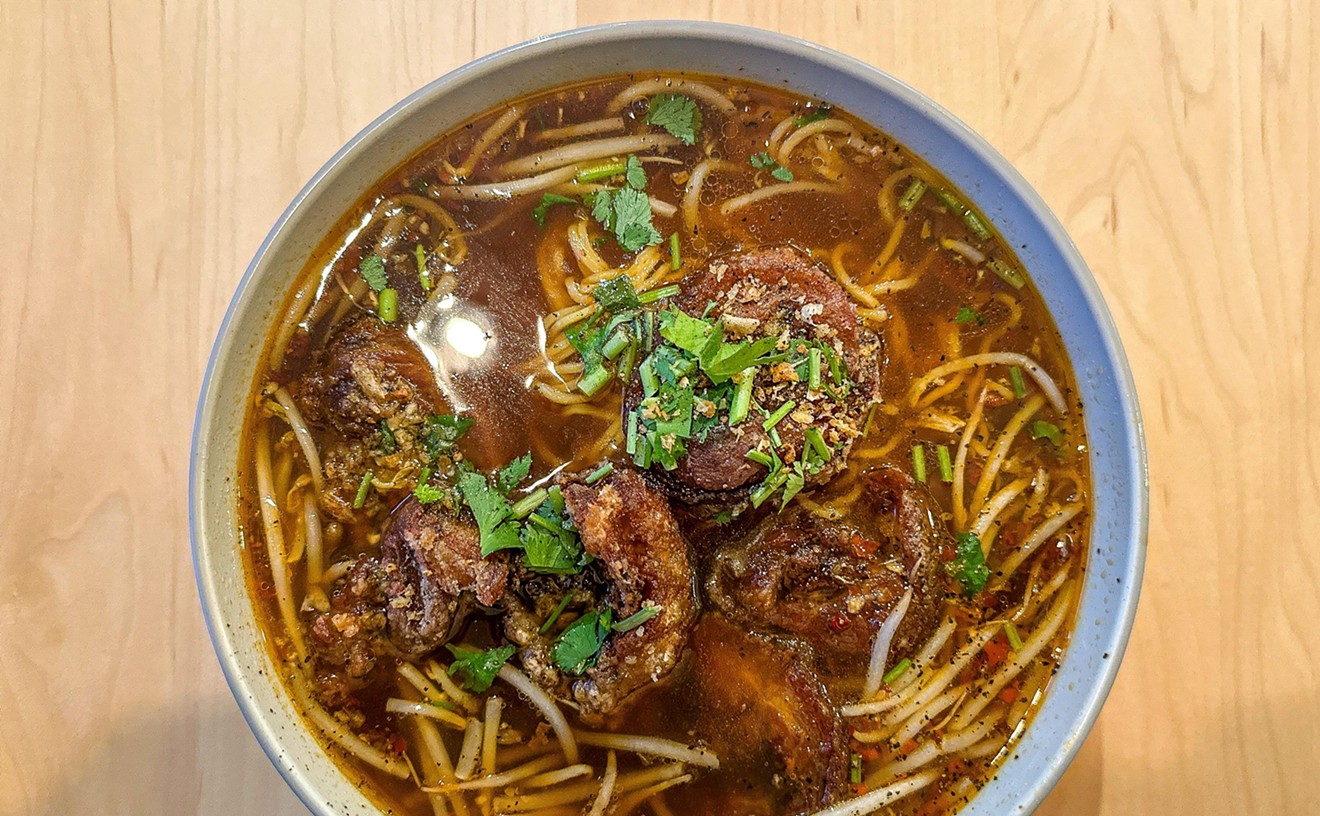French food itself may be delightful, delicious, dreadful, or even, occasionally, dull. But it is always taken seriously by the French, who take many things too seriously, their language and their cuisine most notably. I take language and cuisine pretty seriously, but you have to draw the line: It's reasonable to me, for instance, for the French to object to the American franchise, McDonald's, but not to the American word, "hamburger."
That single-minded seriousness about something as ephemeral as food may be one reason French cuisine has fallen from its pedestal in recent years in this part of the United States. Here, we're more interested in "fun" than food and we mistake seriousness for stuffiness, just as the French occasionally mistake it for snobbery. There are very few French restaurants left in Dallas. There are a number of Franco-Mediterranean restaurants, and there is La Madeleine, which is an American idea, really, acted out in French. But--check the listings--the number of French restaurants has declined. Even The French Room isn't French.
Bonjour is an unambitious little cafe in a hard-to-find corner of an unlikely shopping center, but it has a definitely French sensibility and seriousness. That's not to say it's stuffy at all: It's not.
Owner John Staub has only lived in Dallas for three months; he opened Bonjour two months ago and when we called to see if his restaurant was a place we could take a child, we were told, "Of course! We love kids! If anyone here has a problem, they leave, not the kids."
In fact, Bonjour is a nice change for a family dinner. True, there's no special children's menu, but there's plenty of good, simple, and fairly inexpensive dishes they'll like. Bonjour is loose and comfortable, a long room with an open kitchen, the kind of basic arrangement that would be called simply a deli if it served a different kind of food. There's a refrigerator case filled with desserts, and dry-erase boards list the menu and the specials of the day.
We hesitated when we entered--it looks like the sort of place where you place your order at the counter--but only for a moment. Then someone hurried up to gesture us toward a table (with a little flourish), pull out our chairs, and bring us menus. We'd brought our own wine and our serious waiter brought glasses and uncorked our bottle immediately.
Bonjour features a list of amuse-gueules--call them French tapas. The words mean "to entertain your palate" or "to play with your tastes," and each dish holds several bites of strong flavor. Several slices of translucent, pale pink and white garlic saucisson with Cornichons and tchac-tchouca, roasted, peeled sweet-pepper strips in oil, seemed designed as companions for bread, but why this bread, this grocery store stuff, soft, crumbly, and smelling of the refrigerator? With this food, this fat, pale sausage and slippery peppers, I want crust, I want crumbs and crunch. There were other mistakes--Caesar salad was bland, the nice, sweet Romaine ribs made boring by an insipid dressing, but the neat square of potatoes dauphinois, each wafer-thin slice cemented to the next by a rich omelette-like mixture, browned to a crust on top, was a lovely mouthful, and escargots were succulent and plump, livened by their sauce provencale. (Where's the bread?)
Of course, we had to try "Chicken Bonjour," because we always try the eponymous dishes. And this was one clue as to how serious, as opposed to trendy, Bonjour is: a gentle white breast in a silky egg-enriched cream sauce, precisely the kind of dish restaurants are afraid to serve anymore, exactly what people mean when they say French food is "too rich."
Rich, yes; too, no. In this self-denial decade of Spartan stripped and grilled chicken, you forget how sensuous a simple piece of poached chicken can be, plumped gently to pillow-softness, and lapped luxuriously with a sauce as rich as yellow custard.
A nice little fillet of beef was just as satisfying, hot-griddled to a bare crust on the outside, its fibers still wobbly and running red within. But pasta, speaking of trendy food, was disappointing. It was supposed to be penne, but it was actually fettucine, the swirled mass of it scantily daubed with a fresh tomato sauce that might have flavored a third as many noodles. Desserts are mostly made off premise except for the floating island, a pouf of foam in a sauce like melted ice cream.
Lunch was actually better, busting more cliches. There are a number of sandwiches, on baguette or croissant, and a small selection of entrees ranging from $5 to $8. Poulet grand-mere broke the chicken rules again, the breast simmered in red wine with squares of bacon and mushrooms, the wine reduced to a vigorously salty sauce that leaked over into the nest of roasted and parsleyed new potatoes. Quiche Lorraine reminds you of what this dish was before the chain restaurants got hold of it, a wholesomely simple tart of egg and cream in a flaky crust. The Brie burger was a truly fabulous take on a hamburger--two big, thick patties of beef, with the clean, strong flavor of fresh-chopped steak cooked beautifully medium-rare, sat side by side on a section of mustard-spread baguette, blanketed with pale melted Brie. It was an indulgence, a two-fisted burger, far more than anyone could eat at one meal, but it took the American fast food to a different level. Was this what was intended by the word "hamburger" all along?
Bonjour, 3850 W. Northwest Hwy., Plaza on Bachman Creek, 350-3467. Open for lunch Monday, 10:30 a.m.-2:30 p.m.; for lunch and dinner Tuesday-Thursday, 10 a.m.-11 p.m.; Friday, 10 a.m.-11 p.m.; Saturday 5:30 p.m.-11 p.m.
Paysanne $2.45
Brie Burger $6.85
Garlic Saucisson $3.55
Poulet Grand-mere $6.50
Filet Mignon Parisien $15.70










